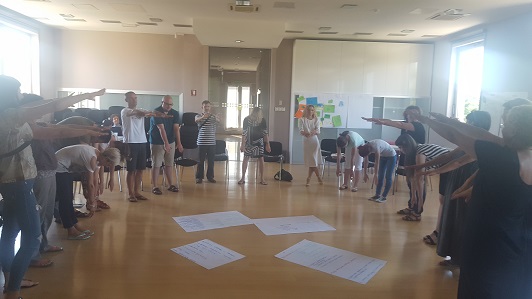From 2 to 7 of July, a joint seminar by GONG and Nansen Dialogue centre was held in the city of Zadar in Croatia.
Combining and upgrading two of the GEAR project partners’ educational seminars that already proved to be successful – Nansen Dialogue Centre Osijek’s Intercultural Education for Inclusive Societies and GONG’s Civic Literacy education gathered around 25 teachers and educators from Croatia working in both elementary and secondary schools, as well as in Civil society organizations and cultural institutions. The trainings also included teachers from the project-partner schools: Elementary School Dalj, The Siniša Glavašević Elementary School from Vukovar and the Economic and Tourism School from Daruvar.

Nansen Dialogue Centre’s Seminar Intercultural Education for Inclusive Societies, taking place July 2-4, focused on underlining the importance of understanding the notions of identity, group identity, respect for diverse identities vs. stereotyping and prejudice, interculturality in societies and imparting the values of inter-culturalism through education.
The seminar consisted of training activities in examining the participants’ experiences with encounters with persons from various social backgrounds and with various social identities, what their initial perceptions were, and how further socializing and learning about each other worked to change (or reinforce) these. The seminar was held by trainers Zehra Delić and Ivana Milas.
The issues covered within the seminar have included the following:
- Identity and respect for diversity,
- Culture, sub-culture and interculturality,
- Social skills,
- Stereotypes and prejudice,
- Intercultural education.

GONG’s Civic Literacy Seminar: Political Literacy Module, taking place July 5-7, was focused on the broad topics of politics and democracy, with a discussion of the most important distinguishing features of modern democracies (liberal democracy, the principle of representation), as well as the various forms of citizens’ social and political participation.
The seminar attempted to balance lectures on various aspects of modern-day democracy with more practical, hands-on activities which encouraged participants to think about the normative definitions and everyday understanding of the notion of ‘politics’, the basic rules governing political communities, and the other, less formal and less frequently used channels of political involvement. The seminar was held by trainers dr. Berto Šalaj and Martina Horvat. The issues covered within the seminar have included the following:
- Political culture and socialization,
- Democracy – its key features, liberalism vs. democracy, post-democracy, democracy assessments,
- Alternative models of democracy – direct, participatory, deliberative and associative democracy,
- Civic participation – social and political engagement, civil society, participating in development of public policies.
- Civic and political education in Croatia.

Both educational seminars had already been implemented before, but have also improved upon continuously and intend to offer new value to each generation of trainees, covering various aspects of promoting human rights and inclusion in modern societies. Overall, the seminar was graded very highly by trainees, with the trainers’ approach and methods being especially highly graded

